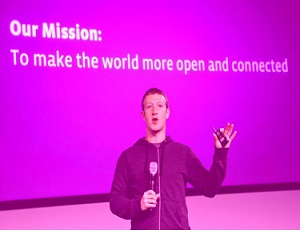Modi to Meet Zuckerberg to Boost Indian Internet Connectivity
DELHI –  Facebook founder and CEO Mark Zuckerberg will today wind up his two day visit to India with a meeting with Indian Prime Minister Narendra Modi. Mr Zuckerberg is in New Delhi to address the first two-day long summit on “internet.org”, his ambitious project to bring connectivity to the world’s billions who currently live without.
Facebook founder and CEO Mark Zuckerberg will today wind up his two day visit to India with a meeting with Indian Prime Minister Narendra Modi. Mr Zuckerberg is in New Delhi to address the first two-day long summit on “internet.org”, his ambitious project to bring connectivity to the world’s billions who currently live without.
India already has some 250 million internet users (expected to jump by another 300 million by 2018) and is the world’s fastest growing smartphone market. However, this accounts for only a small portion of the Asian Giant’s near 1.3 billion population, 45 percent of which live in rural areas with little to no electricity.
As such, internet penetration currently stands at a mere 13 percent, meaning there exists an as-of-yet totally unsaturated and rapidly growing market. With China warily keeping Facebook behind its firewall, India is seen as the next great frontier and is already the social networking site’s second biggest market, after the U.S.
RELATED: E-Commerce on the Rise in India
No doubt Mr Zuckerberg has noted that, despite steady increases of profits from Facebook’s India operations (the 2013 financial year saw a 63 percent rise), the revenue contribution from a country that already makes up over 8.2 percent of the social network’s user base is only 0.29 percent. Turning this around is likely high on the young CEO’s agenda. He will be hoping to forge ties with the government and local telecoms operators, discussing how to provide affordable, local language based content to hard to reach places.
Mr Modi is himself an avid user of social media, which he manipulated skilfully during his successful election campaign. He is vocal in his championing of a “free and open” internet, and has, since its cabinet clearing in August, been pushing his “Digital India” initiative, which aims to improve life and connectivity throughout the country by transforming India into a connected knowledge economy.
RELATED: India set to Experience Surge in Low-Cost Smartphone Market
The Asian Superpower’s underdeveloped infrastructure still poses a barrier to Mr Modi’s and Mr Zuckerberg’s vision, but the Indian PM has been taking great strides to remedy this. Facebook , currently on a hiring spree in India, is not the first Internet giant showing an interest in the country’s young, tech-savvy population and its vastly unsaturated market. In the last two weeks alone, Amazon founder Jeff Bezos and Microsoft boss Satya Nadella have both made pilgrimages there.
The digital revolution is already upon us, and it will be the next 5 billion from countries like India leading the way.
Asia Briefing Ltd. is a subsidiary of Dezan Shira & Associates. Dezan Shira is a specialist foreign direct investment practice, providing corporate establishment, business advisory, tax advisory and compliance, accounting, payroll, due diligence and financial review services to multinationals investing in China, Hong Kong, India, Vietnam, Singapore and the rest of ASEAN. For further information, please email india@dezshira.com or visit www.dezshira.com.
Stay up to date with the latest business and investment trends in Asia by subscribing to our complimentary update service featuring news, commentary and regulatory insight.
Related Reading
 Taking Advantage of India’s FDI Reforms
Taking Advantage of India’s FDI Reforms
In this edition of India Briefing Magazine, we explore important amendments to India’s foreign investment policy and outline various options for business establishment, including the creation of wholly owned subsidiaries in sectors that permit 100 percent foreign direct investment. We additionally explore several taxes that apply to wholly owned subsidiary companies, and provide an outlook for what investors can expect to see in India this year.
 Passage to India: Selling to India’s Consumer Market
Passage to India: Selling to India’s Consumer Market
In this issue of India Briefing Magazine, we outline the fundamentals of India’s import policies and procedures, as well as provide an introduction to the essentials of engaging in direct and indirect export, acquiring an Indian company, selling to the government and establishing a local presence in the form of a liaison office, branch office, or wholly owned subsidiary. We conclude by taking a closer look at the strategic potential of joint ventures and the advantages they can provide companies at all stages of market entry and expansion.
 Trading with India
Trading with India
In this issue of India Briefing, we focus on the dynamics driving India as a global trading hub. Within the magazine, you will find tips for buying and selling in India from overseas, as well as how to set up a trading company in the country.
- Previous Article The Indian Super League: Destined for Economic Success, or Doomed to Fail?
- Next Article India’s Coal Industry Moves Towards Privatization Amidst Trade Union Protests








